
3. Isaiah Chapters 1-5: The Kingdom of God
4. Isaiah Chapters 6-10: God with us
5. Isaiah Chapters 11-26: The Rod of Jesse
6. Isaiah Chapters 27-32 The Righteous King
7. Isaiah Chapters 33-39 The Righteous King
8. Isaiah Chapters 40-43 The Servant of the Lord
9. Isaiah Chapters 44-45 The Servant of the Lord
10. Isaiah Chapters 46-48 The Redeemer and Savior
11. Isaiah Chapters 49-52: The Suffering Servant
2. The Two Pictures (Portraits) of Messiah
I
Introduction to Messiah’s Pictures (Portraits)
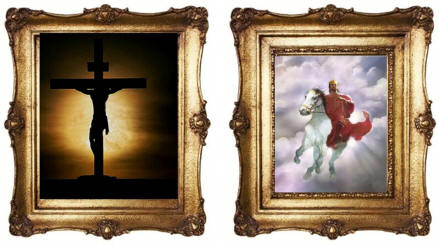 From
the fall of Adam and Eve in the Garden of Eden, God established the plan of
Redemption through the “Seed of the Woman”. This person became known as the
Messiah, or “Anointed One” from the Hebrew meaning. When we
examine the nature and character of this coming person, two striking
pictures emerge from the prophets of the Old Testament, one portrait is of a
“Suffering” servant rejected and killed. The other portrait is of a “Great
King”, who comes with power and great glory to rule over the earth.
From
the fall of Adam and Eve in the Garden of Eden, God established the plan of
Redemption through the “Seed of the Woman”. This person became known as the
Messiah, or “Anointed One” from the Hebrew meaning. When we
examine the nature and character of this coming person, two striking
pictures emerge from the prophets of the Old Testament, one portrait is of a
“Suffering” servant rejected and killed. The other portrait is of a “Great
King”, who comes with power and great glory to rule over the earth.
For many who read the Bible, these two pictures of the Messiah, has become a stumbling block. They don’t understand, why would the Messiah die?, if he was so powerful, if he was the Messiah how could God allow him to die? The Jews in the New Testament had just such a dilemma, the understood the Messiah to be the “Son of David’, but did not see him as a suffering servant. They saw the Messiah, as the great king presented by prophets, who vanquish the oppressors to Israel, namely the Romans.
Therefore when Jesus presented himself as fulfilling the prophets, they did not understand the prophets foretold of the “Rejection” and “Suffering” of Messiah. From their perspective, they were doing everything “Right”, they did not see themselves as “unrighteous” but as “righteous”. Jesus rejected their self-righteousness, and presented Himself as the Messiah, who would redeem humanity, fulfilling the words of the prophets.
Therefore when Jesus entered the synagogue at Nazareth at the beginning
of his ministry, he presented himself as the fulfillment of God’s word, that
he was prophesied in scripture as the coming Messiah or Christ. He read
from
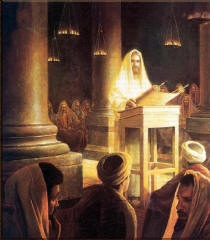 17
And He was handed the book of the prophet Isaiah. And when He had opened the
book, He found the place where it was written:
17
And He was handed the book of the prophet Isaiah. And when He had opened the
book, He found the place where it was written:
18 "The Spirit of the Lord is upon Me, Because He has anointed Me To preach the gospel to the poor; He has sent Me to heal the brokenhearted, To proclaim liberty to the captives And recovery of sight to the blind, To set at liberty those who are oppressed;
19 To proclaim the acceptable year of the Lord."
20 Then He closed the book, and gave it back to the attendant and sat down. And the eyes of all who were in the synagogue were fixed on Him.
21 And He began to say to them, "Today this Scripture is fulfilled in
your hearing."
The people of Nazareth rejected his claims and in fact tried to kill that very day. Their view of Messiah was conquering king who would come in victory and power, to rule over Israel.
28 So all those in the synagogue, when they heard these things, were filled with wrath,
29 and rose up and thrust
Him out of the city; and they led Him to the brow of the hill on which their
city was built, that they might throw Him down over the cliff.
Jesus and the Pharisees
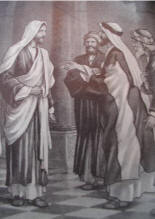 In
the time of Jesus there were several groups of people with conflicting
views. There were the Sadducees who followed only the word of Moses, The
Pharisees, religious Jews who followed the “Traditions” of the elders, the
Zealots, those who wanted to rebel against Rome, and others. Each group had
an agenda and a position.
In
the time of Jesus there were several groups of people with conflicting
views. There were the Sadducees who followed only the word of Moses, The
Pharisees, religious Jews who followed the “Traditions” of the elders, the
Zealots, those who wanted to rebel against Rome, and others. Each group had
an agenda and a position.
The Pharisees are the most well known, Jews in the world today are descended from the Pharisees in the time of Jesus. Jesus challenged their understanding of Messiah, by asking them to explain the two pictures of Messiah. The Messiah was known according to the prophets to be a “Son of David” (2nd Samuel 7:14-16). If he was a “Son of David”, he would also be a “Son of man”. So Jesus asked how was it that David referred to the Messiah as his “Lord” if the Messiah was “his son”? How could he be both “Lord” of David and a “Son of David”?
41 While the Pharisees were gathered together, Jesus asked them,
42 saying, "What do you think about the Christ? Whose Son is He?" They said to Him, "The Son of David." 43 He said to them, "How then does David in the Spirit call Him 'Lord,' saying:
44 'The Lord said to my Lord, "Sit at My right hand, Till I make Your enemies Your footstool" '?
45 "If David then calls Him 'Lord,' how is He his Son?"
46 And no one was able to
answer Him a word, nor from that day on did anyone dare question Him
anymore.
The Pharisees could not answer Jesus, because they really did not understand why the Messiah needed to be “Son of man” and yet be “Lord” of man. For them, the Messiah would be only of human descent, they did not understand the reason Messiah would also have to be the “Son of God” as well as the “Son of man”.
Why a “Son of Man”
Jesus was trying to help the Pharisees understand just who “Messiah” (Christ) is. Going back to the fall in the Garden of Eden, humanity was separated from God. After the fall of humanity, just how could Adam and Eve and future generations be restored. The answer for many is “Good Works” the problem is no matter how much good someone does they can never be sinless, since all of humanity fell with the sin of Adam and Eve. Man required a “Redeemer”, someone who could pay the penalty for the sin.
The concept of Redemption is an ancient one found in the Bible, the Hebrew word for Redeemer is lag Ga'al , meaning literally kinsman, when you relative, you can act in the interest of your “kinsman”. If you family had a debt, someone who was a “kinsman” could pay the debt and “save” their kinsman.
This is exactly why God, said Adam, Eve and the Serpent, that the “Seed” of the woman would crush the head of the Serpent (Genesis 3:15). Because the “Seed” of the woman would be a “Kinsman” or “Redeemer” of Adam and Eve and their offspring. Therefore as relative, “Son of man” “Son of David”, he could take the debt of Humanity offense. Job who lived in the time of Abraham, wrote the following words regarding the coming of the Redeemer who would bring him to life after he (Job) died.
25 For I know that my Redeemer lives, And He shall stand at last on the earth;
26 And after my skin is destroyed, this I know, That in my flesh I shall see God,
27 Whom I shall see for
myself, And my eyes shall behold, and not another. How my heart yearns
within me!
The Redeemer, would pay for the sins of all humanity, because he can stand in the place of those who owed the debt of sin. His life for our life.
The line of Redemption
![]()
The Redemption of Humanity is the center issue of scripture. Humankind
is lost, fallen in nature, the way we are redeemed is through the actions of
the Messiah (Jesus Christ) who would pay for our sins on the cross.
Therefore, the focus is the Old Testament is “Redemption” through the
Redeemer.
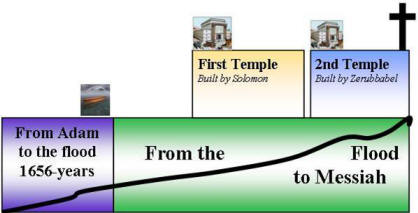
For this reason Jesus clearly states, He is the central focus of scripture, because He is the Redeemer who takes upon Himself the sins of the world.
39 "You search the
Scriptures, for in them you think you have eternal life; and these are they
which testify of Me. 40 "But you are not willing to come to Me that you may
have life
Therefore the line of the Messiah is traced from Adam and Eve to the birth of Jesus, showing him as kinsman to fallen humanity.
§ Adam and Eve:
(Genesis 1-5)
§ From Adam to Noah; (Genesis 5)
§ From Noah to Abraham
(Genesis
§ From Abraham to Jacob
(Genesis 12 to 35)
§ From Jacob to Judah
(Genesis 38 to Exodus)
§ From Judah to David
(Exodus to Ruth to Samuel to Kings)
§ From David to Mary: Mary is “Daughter of David”, Joseph is “Son of David”
(Luke 4,
A great illustration of this cord of “Redemption” is pictured in the book of Joshua, as Rahab the harlot from Jericho, becomes a follower of the God of Israel, and rescues the Hebrew spies. Rahab is told to drop from her house in Jericho a “Red Cord” to the ground. Rahab is saved from destruction along with everybody in her house. Rahab also become the great grandmother of Obed, who is the grandfather of Jesse, who is the father of David. Therefore Rahab is in the line of Messiah. The “Red cord” is a picture of the line of redemption. (Joshua 2:18)
The Revelation of the prophets
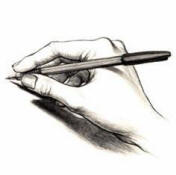 From
the fall at the Garden of Eden, God began to reveal His plan of redemption.
God spoke through individuals who were pens in the hand of God. There
Words were God’s revelation. In the same way someone would write with a
pen, God wrote through people. Isaiah, Jeremiah, Samuel, David were the
pens of God, who revealed His intentions through these men. There words
came to be known as scripture. These words were transmitted by copying
manuscripts, scribes were individuals who work it was to copy manuscripts
from manuscripts, this is known as manuscript transmission.
From
the fall at the Garden of Eden, God began to reveal His plan of redemption.
God spoke through individuals who were pens in the hand of God. There
Words were God’s revelation. In the same way someone would write with a
pen, God wrote through people. Isaiah, Jeremiah, Samuel, David were the
pens of God, who revealed His intentions through these men. There words
came to be known as scripture. These words were transmitted by copying
manuscripts, scribes were individuals who work it was to copy manuscripts
from manuscripts, this is known as manuscript transmission.
The evidence of Revelation
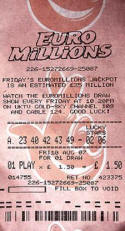 What
evidence do we have of this plan? God through the prophets demonstrated
provides the evidence of revelation, through time. The prophets wrote about
the events before they took place.
What
evidence do we have of this plan? God through the prophets demonstrated
provides the evidence of revelation, through time. The prophets wrote about
the events before they took place.
For example, if someone told you they could predict the future, most people
would laugh because they understand it not ordinary to tell the future and
many people who attempt it are often wrong. What kind of evidence could
someone provide to establish credibility that they can predict the future,
simply demonstrate their ability.
If they wrote down the lottery number 1-week in advance and the number, turned out as written you would have three options. One, he guessed right, two he conspired with someone or three, he had some “Super-natural” ability. Super-natural means something beyond common nature. Now if the person gave a second and third prediction of the lottery, they would establish their credibility all the more.
This is the evidence God provides through the prophets, he revealed aspect of the Messiah and events to follow, thousands of years before the events. He works through history to demonstrate the validity of His Word.
3 "I have declared the former things from the beginning; They went forth from My mouth, and I caused them to hear it. Suddenly I did them, and they came to pass.
4 Because I knew that you were obstinate, And your neck was an iron sinew, And your brow bronze,
5 Even from the beginning I
have declared it to you; Before it came to pass I proclaimed it to you, Lest
you should say, 'My idol has done them, And my carved image and my molded
image Have commanded them.'
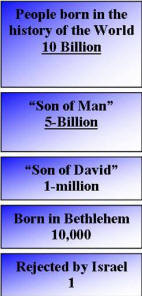
Through prophecy God isolated an individual from the rest of humanity. For example the person is called a “Son of man”, with those words 50% of the population is eliminated from the pool of the Messiah. Because now we know the Messiah is male not female.
When he is called a “Son of David”, meaning he is descendent of David, king of Israel who lived 3000-years ago, over 99 % of the world’s population is eliminated from the population. When we are told he would be born in the city of Bethlehem, again the population of potential people is reduced. So the result is
First Coming: The “Suffering Servant”
Isaiah along with the other prophets describe two different portraits of the same person. This first portrait is of an individual who suffers for the sins of the world, while the second is one who rules over the world. Lets examine aspects of the first coming of Messiah:
1. Messiah “Cut off”
Daniel wrote in 539 B.C.,the Messiah would be cut off (killed) “but not for himself” 69-sevens (483) after the decree to build Jerusalem was issued. After his death the city of Jerusalem and the Temple would be destroyed. This took place in A.D. 70
26 "And after the sixty-two weeks Messiah shall be cut off, but not for
Himself; And the people of the prince who is to come Shall destroy the city
and the sanctuary. The end of it shall be with a flood, And till the end of
the war desolations are determined.
2. The hands and feet of Messiah would be pierced
David wrote 1000-B.C. that the Messiah’s hands and feet would be pierced, they would then divide his garments.
16 For dogs have surrounded Me; The congregation of the wicked has enclosed Me. They pierced My hands and My feet; 17 I can count all My bones. They look and stare at Me.
18 They divide My garments among them, And for My clothing they cast lots. Psalm 22:16-18
3. Back whipped, Beard pulled and spit upon:
Isaiah describes the treatment of the servant, who would later die for the sins of world 700-B.C. He suffers at the hands of the wicked.
6 I gave My back to those who struck Me, And My cheeks to those who plucked out the beard; I did not hide My face from shame and spitting.
7 "For the Lord God will
help Me; Therefore I will not be disgraced; Therefore I have set My face
like a flint, And I know that I will not be ashamed.
4. He is despised and rejected:
14 Just as many were astonished at you, So His visage was marred more
than any man, And His form more than the sons of men;
He is despised and rejected by men, A Man of sorrows and acquainted with grief. And we hid, as it were, our faces from Him; He was despised, and we did not esteem Him. 53:3
All we like sheep have gone astray; We have turned, every
one, to his own way; And the Lord has laid on Him the iniquity of us all.
5. He is described as entering Jerusalem on a Donkey:
The Messiah (Christ) is the King of world, according to the prophets, but Zechariah describes him as lowly, riding a donkey as he enters Jerusalem but having salvation. Zechariah wrote about 520 B.C.
"Rejoice greatly, O daughter of Zion! Shout, O daughter of
Jerusalem! Behold, your King is coming to you; He is just and having
salvation, Lowly and riding on a donkey, A colt, the foal of a donkey.
6. He is described as being born a child:
Isaiah describes his human birth, and names he would be called.
For unto us a Child is born, Unto us a Son is
given; And the government will be upon His shoulder. And His name will be
called Wonderful, Counselor, Mighty God, Everlasting Father, Prince of
Peace.
Second Coming: The Glorious King
1. Messiah’s Kingdom is described as “Everlasting”
Isaiah describes the kingdom of the “Son of David” as an everlasting kingdom, which will never know an end.
7 Of the increase of His government and peace There will be no end, Upon
the throne of David and over His kingdom, To order it and establish it with
judgment and justice From that time forward, even forever. The zeal of the
Lord of hosts will perform this.
2. Messiah’s Kingdom is worldwide:
The kingdom of the Messiah will be over the whole earth, Jerusalem will be its capital.
I will cut off the chariot from Ephraim And the horse from
Jerusalem; The battle bow shall be cut off. He shall speak peace to the
nations; His dominion shall be 'from sea to sea, And from the River to the
ends of the earth.'
3. The Messiah is the “Son of God”:
Psalms tells us the Messiah, will decreed the “Son” of the LORD (God), 1000-years before the birth of Jesus.
6 "Yet I have set My King On My holy hill of Zion."
7 "I will declare the decree: The Lord has said to Me, 'You are My Son, Today I have begotten You.
8 Ask of Me, and I will give You The nations for Your inheritance, And the ends of the earth for Your possession. Psalm 2:6-8
4. There will be peace in His day:
The wicked will not prosper in His kingdom, the world will be righteous and the poor and the meek will have justice in his kingdom. This is contrasted to the current status of the world.
4 But with righteousness He shall judge the poor, And decide with equity for the meek of the earth; He shall strike the earth with the rod of His mouth, And with the breath of His lips He shall slay the wicked.
5 Righteousness shall be the
belt of His loins, And faithfulness the belt of His waist.
6. Messiah will be King and God ruling from Jerusalem:
And it shall come to pass that everyone who is left of all
the nations which came against Jerusalem shall go up from year to year to
worship the King, the Lord of hosts, and to keep the Feast of Tabernacles.
7. He comes with Glory and Power:
1 Who is this who comes from Edom, With dyed garments from Bozrah, This One who is glorious in His apparel, Traveling in the greatness of His strength?-"I who speak in righteousness, mighty to save."
2 Why is Your apparel red, And Your garments like one who treads in the winepress?
3 "I have trodden the
winepress alone, And from the peoples no one was with Me. For I have trodden
them in My anger, And trampled them in My fury; Their blood is sprinkled
upon My garments, And I have stained all My robes. 4 For the day of
vengeance is in My heart, And the year of My redeemed has come.
The Day of the Lord
The Second Coming of the Messiah is known as the Day of The Lord, His coming corresponds with wrath and judgment for sin. The “Day of the Lord” is referred to 5 times in the book of Isaiah. The event is the transition from the kingdoms of “this age” to the kingdom of God, when Messiah (Christ) rules over the nations with Glory and Great Power.
12 For the day of the Lord of hosts Shall come upon everything proud and
lofty, Upon everything lifted up-And it shall be brought low
6 Wail, for the day of the Lord is at hand! It will come as destruction from the Almighty. 7 Therefore all hands will be limp, Every man's heart will melt,
8 And they will be afraid.
Pangs and sorrows will take hold of them; They will be in pain as a woman in
childbirth; They will be amazed at one another; Their faces will be like
flames. 9 Behold, the day of the Lord comes, Cruel, with both wrath and
fierce anger, To lay the land desolate; And He will destroy its sinners from
it.
The Kingdom of God
1. Jerusalem will be the capital:
1 The word that Isaiah the son of Amoz saw concerning Judah and Jerusalem.
2 Now it shall come to pass in the latter days That the mountain of the Lord's house Shall be established on the top of the mountains, And shall be exalted above the hills; And all nations shall flow to it.
3 Many people shall come and say, "Come, and let us go up to the mountain of the Lord, To the house of the God of Jacob; He will teach us His ways, And we shall walk in His paths." For out of Zion shall go forth the law, And the word of the Lord from Jerusalem.
4 He shall judge between the
nations, And rebuke many people; They shall beat their swords into
plowshares, And their spears into pruning hooks; Nation shall not lift up
sword against nation, Neither shall they learn war anymore.
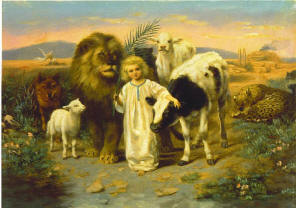 2.
Animal nature will be changed:
2.
Animal nature will be changed:
6 "The wolf also shall dwell with the lamb, The leopard shall lie down with the young goat, The calf and the young lion and the fatling together; And a little child shall lead them.
7 The cow and the bear shall
graze; Their young ones shall lie down together; And the lion shall eat
straw like the ox. 8 The nursing child shall play by the cobra's hole, And
the weaned child shall put his hand in the viper's den..
3. The knowledge of God shall be like the ocean
9 They shall not hurt nor destroy in all My holy mountain, For the earth
shall be full of the knowledge of the Lord As the waters cover the sea

|
MESSIANIC PROPHECIES OF THE OLD TESTAMENT |
||
|
PROPHECY |
OT REFERENCES |
NT FULFILLMENT |
|
Seed of the woman |
|
|
|
Through Noah’s sons |
|
|
|
Seed of Abraham |
|
|
|
Seed of Isaac |
|
|
|
Blessing to nations |
|
|
|
Seed of Isaac |
|
|
|
Blessing to Gentiles |
|
|
|
Blessing through Abraham |
|
|
|
Of the tribe of Judah |
|
|
|
No bone broken |
Exod 12:46, |
|
|
Blessing to firstborn son |
Exod 13:2 |
|
|
Serpent in the wilderness |
|
|
|
A star out of Jacob |
|
|
|
As a prophet |
|
|
|
Cursed on the tree |
|
|
|
The throne of
David |
|
|
|
A promised Redeemer |
|
|
|
Declared to be the Son of God |
Ps 2:1-12 |
|
|
His resurrection |
Ps 16:8-10 |
|
|
Hands and feet pierced |
Ps 22:1-31 |
|
|
Mocked and insulted |
Ps 22:7-8 |
|
|
Soldiers cast lots for coat |
Ps 22:18 |
|
|
Accused by false witnesses |
Ps 27:12 |
|
|
He commits His spirit |
Ps 31:5 |
|
|
No broken bone |
Ps 34:20 |
|
|
Accused by false witnesses |
Ps 35:11 |
|
|
Hated without reason |
Ps 35:19 |
|
|
Friends stand afar off |
Ps 38:11 |
|
|
“I come to do Thy will” |
Ps 40:6-8 |
|
|
Betrayed by a friend |
Ps 41:9 |
|
|
Known for righteousness |
Ps 45:2, 6-7 |
|
|
His resurrection |
Ps 49:15 |
|
|
Betrayed by a friend |
Ps 55:12-14 |
|
|
His ascension |
Ps 68:18 |
|
|
Hated without reason |
Ps 69:4 |
|
|
Stung by reproaches |
Ps 69:9 |
|
|
Given gall and vinegar |
Ps 69:21 |
|
|
Exalted by God |
Ps 72:1-19 |
|
|
He speaks in parables |
Ps 78:2 |
|
|
Seed of David exalted |
Ps 89:3-4, 19, |
|
|
Son of Man comes in glory |
Ps 102:16 |
|
|
“Thou remainest!” |
Ps 102:24-27 |
|
|
Prays for His enemies |
Ps 109:4 |
|
|
Another to succeed Judas |
Ps 109:7-8 |
|
|
A priest like Melchizedek |
Ps 110:1-7 |
|
|
The chief
cornerstone |
Ps 118:22-23 |
|
|
The King comes
in the |
Ps 118:26 |
|
|
David’s seed to
reign |
Ps 132:11 |
|
|
Declared to be
the Son of God |
|
|
|
Repentance for the nations |
|
|
|
Hearts are hardened |
|
|
|
Born of a virgin |
|
|
|
A rock of offense |
|
|
|
Light out of darkness |
|
|
|
God with us |
|
|
|
Full of wisdom and power |
|
|
|
Reigning in mercy |
|
|
|
Peg in a sure place |
|
|
|
Death swallowed up in victory |
|
|
|
A stone in Zion |
|
|
|
The deaf hear, the blind see |
|
|
|
King of Kings, Lord of Lords |
|
|
|
Son of the Highest |
|
|
|
Healing for the
needy |
|
|
|
Make ready the
way of |
|
|
|
The Shepherd
dies for |
|
|
|
The meek servant |
|
|
|
A light to the Gentiles |
|
|
|
Scourged and spat upon |
|
|
|
Rejected by His people |
|
|
|
Suffered vicariously |
|
|
|
Silent when accused |
|
|
|
Crucified with transgressors |
|
|
|
Buried with the rich |
|
|
|
Calling of those not a people |
|
|
|
Deliver out of Zion |
|
|
|
Nations walk in the light |
|
|
|
Anointed to preach liberty |
|
|
|
Called by a new name |
|
|
|
The King cometh |
|
|
|
A vesture dipped in blood |
|
|
|
Afflicted with the afflicted |
|
|
|
The elect shall inherit |
|
|
|
New heavens and a new earth |
|
|
|
The Lord our righteousness |
|
|
|
Born a King |
|
|
|
Massacre of infants |
|
|
|
Conceived by the Holy Spirit |
|
|
|
A New Covenant |
|
|
|
A spiritual house |
|
|
|
A tree planted by God |
|
|
|
The humble exalted |
|
|
|
The good Shepherd |
|
|
|
Stone cut without hands |
|
|
|
His kingdom triumphant |
|
|
|
An everlasting dominion |
|
|
|
Kingdom for the saints |
|
|
|
Time of His birth |
|
|
|
Israel restored |
|
|
|
Flight into Egypt |
|
|
|
Promise of the Spirit |
|
|
|
The sun darkened |
|
|
|
Restoration of tabernacle |
|
|
|
Israel regathered |
|
|
|
The kingdom established |
|
|
|
Born in Bethlehem |
|
|
|
Earth filled
with knowledge |
|
|
|
The Lamb on the throne |
|
|
|
A holy priesthood |
|
|
|
A heavenly High Priest |
|
|
|
Triumphal entry |
|
|
|
Sold for thirty pieces of silver |
|
|
|
Money buys potter’s field |
|
|
|
Piercing of His body |
|
|
|
Shepherd
smitten— |
|
|
|
Preceded by Forerunner |
|
|
|
Our sins purged |
|
|
|
The light of the
world |
|
|
|
The coming of Elijah |
|
|